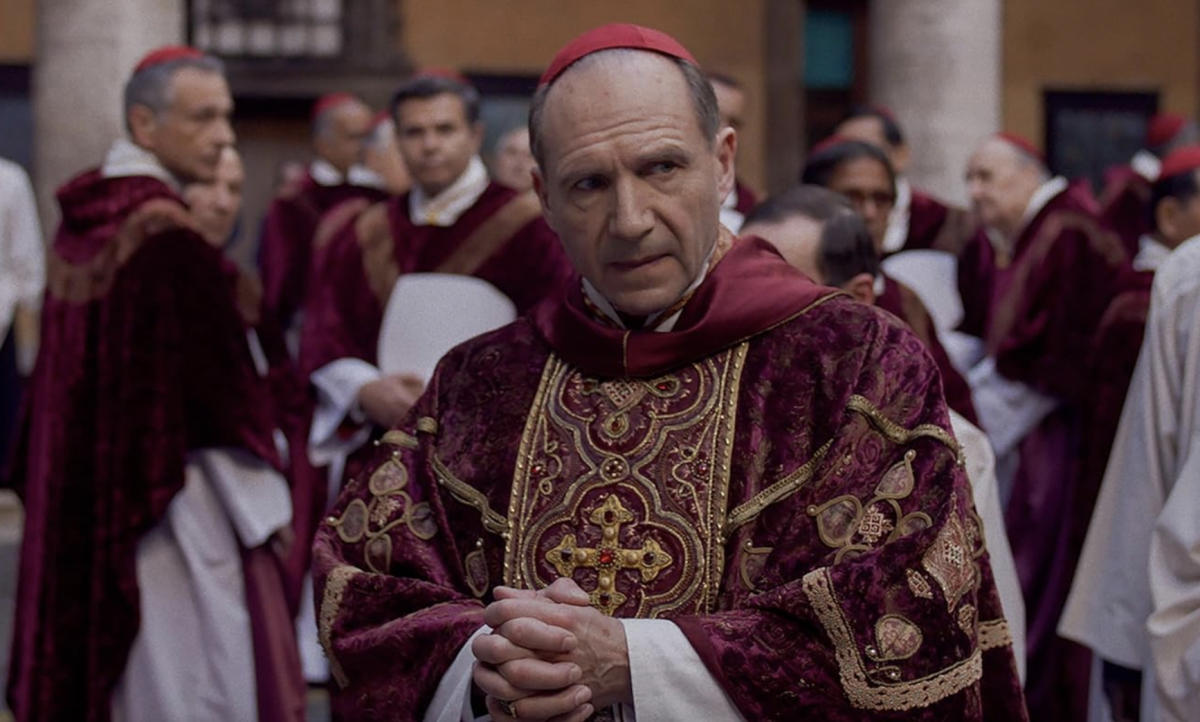Election day is upon us, and as our current political climate has seemingly devolved into a never-ending soap opera, it might be comforting to know that other systems of power have maintained their integrity. But the film “Conclave,” adapted from Robert Harris’s novel of the same name, is keen on proving that even the Catholic College of Cardinals is not immune to the petty antics, bribery and scandal that can mirror our own state of affairs.
The pope has died and before anyone can make an official prognosis, the question of who will take the Holy Father’s place is on everyone’s mind. Over a hundred cardinals from all over the world are gathered in Rome, each one vying for their spot atop the vacant throne. The responsibility of the conclave (the group of cardinals tasked with deciding the next pope) falls upon the Dean of Cardinals, Cardinal Lawrence (Ralph Fiennes), who carries the burden with a grave attitude as he suffers from his own crisis of faith.
Fiennes is at the stage in his career where he may have just the right amount of wrinkles on his face to portray an anguished cardinal. He brings an interiority to Cardinal Lawrence that is otherwise uninterrogated by Peter Straughan’s script. Complementing his central performance is a stellar cast who are all up to the task of elevating this pulpy and, at times, overly moralistic material. As the cardinals are sequestered and the conclave is assembled, we are introduced to the array of egos and agendas that will surely lead to high-tension theatrics.
Cardinal Bellini is the progressive candidate, whose pragmatism and sharp cognizance are embodied in Stanley Tucci’s performance – Tucci is no stranger to playing confident, sure-handed professionals (see his brilliant role in “Spotlight”). He doesn’t so much want the power that comes with the papacy, but he is more than determined to prevent Cardinal Tedesco (Sergio Castellito) from being elected, mostly out of fear that he might undo decades of progress. Bellini wants to see the Catholic Church into the future, while Tedesco is a vulgar conservative who would rather see traditional Roman-Catholic values restored. The film returns to this idea of the new way versus the old way, as well as the dichotomy between the sacred rituals of the church and its contemporary blemishes. Sure, these cardinals repeat their vows in Latin, but Tedesco is wielding a vape for nearly the entire movie and another cardinal can be seen scrolling on his phone.
We also have Cardinal Tremblay (John Lithgow), who seems to be plotting from the jump, as well as Cardinal Adeyemi (Lucian Msamati), an outspoken homophobe. And to top it off, there’s also the mysterious arrival of Cardinal Benitez (Carlos Diehz), whose very existence was kept a secret prior to the pope’s death. This shady lineup forces Lawrence and Bellini to come to terms with the fact that they may just have to champion the “least objectionable candidate” (rings a bell, right?).
Under Edward Burger’s nimble direction, aided by Volker Bertelmann’s thrumming violin score, the multi-day election unfolds with the suspense and intrigue of an Agatha Christie novel. At times Straughan’s script does get needlessly caught up in its attempt to provide a meaningful allegory to our own government (there’s also a third act twist that’s a Hail Mary, to say the least), but it still gives enough opportunity for our cardinals to have some fun. The movie is at its best, most intense when Fiennes is in in frame, close up, giving a monologue about the meaning of faith, or when Stanley Tucci is yelling, “This is a war! And you need to pick a side.” Not to mention Isabella Rossilini, as Sister Agnes, shuffling around the periphery of the conclave before finally getting her moment to put these futile men in their place. These scenes border on melodramatic Oscar-bait but ultimately make for a film that is more compelling than perhaps it should be.
If the committed cast isn’t enough to keep you engaged, “Conclave” also happens to be one of the best-looking movies of the year. Burger makes ample use of the Sistine Chapel’s heavenly interiors. We get a camera gliding down beautiful marble hallways as it follows Fiennes, donning red silk robes, breathing heavily in his uncertainty (the sound design is also immaculate). The audience also sees Tucci sitting anxiously, wearing a mitre, in a room full of beautifully painted walls. If that doesn’t sound appealing, then frankly it might be time you question your faith.
Despite its best efforts at feeling prescient, “Conclave” never vaults above a well-crafted thriller with some lively performances, and that’s okay. Its message about democracy is cursory to the real allure of the film, with overqualified character actors yelling at each other while wearing fancy costumes. Any Oscar consideration this movie gets would be a bit of a stretch, but by all means, head to the theater and worship at the altar of Ralph Fiennes. We should all repent for not giving him his blessings sooner.
Luke Walsh can be reached at [email protected].



















